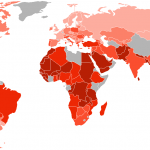My wife spent this past weekend on a silent retreat—her first. Despite what it sounds like, such retreats are not entirely silent, of course. There is spiritual direction, a variety of instruction, a book-on-CD playing during meals, and daily Mass. But you’re not expected to talk, to spend time networking, making or renewing friendships, or trying to seem interesting. It’s like the opposite of going to the annual meeting of the American Sociological Association (and probably no shortage of Christian conferences, either). As a result, it can be quite disorienting at first. It’s as if you’re in a foreign place, because—in a very real way—you are. I went on one last June, with some hesitation and second thoughts, only to find it the finest few days I’d spent in a very long time.
Why is that? What is it about silence that intellectually attracts us, but in reality repulses us?
The 17th-century French mathematician, philosopher, and well-rounded intellectual Blaise Pascal—I think—observed that our miseries come from our inability to sit quietly alone in a room (I’ve misplaced my copy of the Pensées, so I can’t confirm this.) While that may be a stretch, Pascal was certainly onto something. The impulse to mitigate silence is not new. There are very few of us in this wired Western world who can truly relish unmolested quietness for more than, say, a few minutes. I work in a relatively-quiet office for hours a day, but it’s not the same. I’m working, plugged in, online, and available (but selectively responsive). Even when I’m alone at home, my tendency is to pull up a favorite Pandora station.
So while we are prone to fantasize about stealing a half-hour to just sit, or meditate, or pray—and complain about our inability to find or be afforded those minutes by a spouse or away from children—I suspect it’s often a fantasy, or a false front. We say that silence is golden, but live as if it’s deafening. We’ll replace it with just about anything: a phone call, reading, a television program, even Bible study. Sitting quietly in a room doesn’t dose us with any dopamine, doesn’t feel productive, and as a result can’t hold a candle—in our brain—to things like the delightful ping of our inbox or to the sanctioned snooping innocently afforded by Facebook. We say we’re doing work. But in reality we have a problem. Of course, to paraphrase Paul, I’m “the worst of sinners.” (Just how bad am I? I’m chasing my kids off while trying to write this post!)
Speaking of Facebook, new nationally-representative survey data that I’m just beginning to analyze reveals that lots of us are doing more online social networking than we probably ought to: 16 percent of men and 23 percent of women report spending two or more hours a day doing just that. While you may be quick to dissociate yourself from “those people,” my point is to note how rapidly—and how extensively—this has become an issue for us. How many of you, after all, were social networking four years ago? Not many. Now roughly 20 percent of the country is doing more of it than they should. Talk about meeting—or rather, creating—a felt need.
C.S. Lewis claimed that “we read to know we are not alone.” But now we have a new way to know we’re not alone. Be careful, though: in the very same data, I’ve noted that the same people who spend more and more time social networking online also report being more depressed, more stressed, and less happy. I won’t go so far as to claim here that things like Facebook can depress you, or make you unhappy, although I suspect that can be true. What sociologists call “self-selectivity” may also be at work; that is, stressed and struggling folks are attracted to online social networks.
At bottom, sustained quiet—real silence—is uncomfortable because it reveals my dependence on God for what it is: shallow, fragile, contingent. Instead, I rise and fall with the esteem of mortals, whether measured by “ping” sounds or “like” functions.
I won’t offer any platitudes about finding “quiet time” this Advent season. I’m still pretty poor at it, and you probably are too, given that you’re online and reading this. Let’s just make a pact that we will be mindful of our problem with silence. Admitting it is a good place to start, eh?
Let all mortal flesh keep silence.












